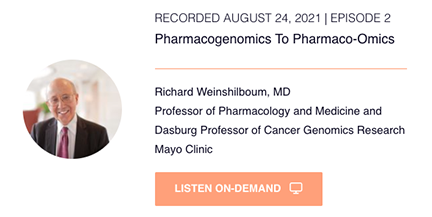With a focus on pharmacogenomics testing, proposed legislation would boost public demand for precision medicine treatments and build better electronic infrastructure to support precision medicine
Recently introduced bipartisan legislation—named the “Right Drug Dose Now Act” (HR 6875), cosponsored by Tom Emmer (R-Minnesota) and Eric Swalwell (D-California)—aims to educate the public on the benefits and availability of pharmacogenomic treatment options while also empowering healthcare entities and providers to leverage the benefits that pharmacogenomics offers.
Pharmacogenomics uses a person’s genetic information to determine how they will respond to certain medications. This allows for personalized doses of medication—or the types of medications used—to be based on an individual patient’s unique genetic features. Not only does pharmacogenomics allow for more effective treatment options, it may also prevent adverse drug effects.
In recent years, molecular and genetic testing labs have been developing pharmacogenetic tests to study genetic variants that interfere with a person’s ability to process drugs. According to Labcorp, the terms “pharmacogenetics” and “pharmacogenomics” are sometimes used interchangeably, but Labcorp notes that the differences between the two terms are subtle and there is no consensus on their exact definitions.
Personalized Drug Therapy Has Made Strides for at Least 25 Years
“Today’s drugs are designed to work ‘as an average dose that will make the average person less sick on average,’” explained Andrew Marshall, PhD, of King’s College London and now a long-time editor at Nature Biotechnology, for an article published in The Lancet back in June of 1998. That article is titled “Personalised’ Drug Therapy Could Be Near,” and it goes on to state that underdosing, overdosing, and missed dosing account for more than $100 billion yearly in increased hospital admissions, lost productivity, and premature deaths. The cost could be much higher today.
That same Lancet article credited Judes Poirier, PhD, of the McGill Centre for Studies in Aging in Montreal, Canada, for a discovery that patients with Alzheimer’s disease who have certain APOE-[epsilon]4 variants do not respond to tacrine therapy. Research into APOE4 and therapies for Alzheimer’s continues.
And for years, cancer treatments have been an active area of research. The Lancet article credited Richard Weinshilboum, MD, of the Mayo Foundation in Rochester, Minnesota, for showing that patients with cancer who have variants of the thiopurine methyltransferase (TPMT) gene experience profound myelosuppression if treated with standard doses of thiopurine drugs. In other words, the absence of an enzyme crucial to drug metabolism can cause significant harm in some situations. Weinshilboum and others continued their research, and lab testing has also continued, to prevent toxicity caused by thiopurine and other drugs.
Such research has led the U.S. Food and Drug Administration (FDA) to recommend genotyping or phenotyping for TPMT deficiency prior to starting thiopurines. More information on this topic can be found in the article “Thiopurines’ Metabolites and Drug Toxicity: A Meta-Analysis,” which was published in 2020 in the international, peer-reviewed Journal of Clinical Medicine.
In addition, the National Human Genome Research Institute (NHGRI) points to several pharmacogenomic studies that could improve treatment for colon cancer and breast cancer.
For hospital and health system executives, these are just a few of the examples of pharmacogenomics and pharmacogenetics in practice for precision medicine.
For those interested in learning more, Weinshilboum joined Precision Medicine Institute’s Live Briefings Service in August 2021 to explain an even newer development; that is how pharmacogenomics is morphing into “pharmaco-omics.” This program can be accessed (free) through our Go To Webinar signup page at the following link: https://register.gotowebinar.com/register/6115804048812025869.
Pharmacogenomics Means No More ‘Test and See’ Approach to Prescribing Medications
Pharmacogenomics improves the process of determining the best treatment approach. It enables physicians to select medications based on a patient’s genetics and physiology. The impact of previous research work and innovation in clinical laboratory testing can be seen in the proliferation of specialty genetic testing labs that are entering the marketplace at a record pace.

(Photo: LinkedIn)
“Without knowing which medication will be the optimal choice for a given patient, it can be trial and error for a physician—they pick a medication based on their past experience or drug prescribing information in the hope that the patient’s body responds effectively to it,” said Stacey Blankenship, PharmD (pictured), in a statement discussing the proposed HR 6875 legislation. Blankenship is a Consultant Pharmacist at Glen Allen, Virginia-based GENETWORx, a molecular diagnostic testing company that offers DNA medication-response testing and patient-specific medication reports in the area of psychiatric conditions, according to the company’s website.
Psychiatry constitutes a field where pharmacogenomic testing might help in guiding drug therapy, stated Erasmus Medical Center, Netherlands laboratory medicine specialist and Professor of Pharmacogenetics Ron van Schaik, PhD, and others, in 2020 for Frontiers in Pharmacology. The article “Pharmacogenetics in Psychiatry: An Update on Clinical Usability” offers a glimpse into some of the work guiding drug therapy for psychiatric conditions.
4 Key Actions of HR 6875 for Pharmacogenomics in the US
According to information released during the announcement of the proposed bill, the Right Drug Dose Now Act (HR 6875) presents four key actions to promote pharmacogenomics. HR 6875 would:
- Update the Department of Health and Human Services’ National Action Plan for Adverse Drug Event Prevention.
- Create an educational campaign to prevent adverse drug events.
- Improve electronic health record (EHR) systems to support pharmacogenomics.
- Allocate additional funding to the Genomic Community Resources program at the National Institutes of Health (NIH), specifically for pharmacogenomics research.
The new bill’s introduction alone could significantly increase public awareness and interest in pharmacogenomics and precision medicine, even though barriers may still exist in adopting pharmacogenomic testing as a routine practice in clinical care.
While researchers regularly make new discoveries in genomics, many physicians practicing today have had little, if any, training on how to incorporate genetics into their patients’ care. Nevertheless, hospital and health system executives should become more familiar with how pharmacogenetics testing has influenced the standard of care and where pharmacogenomics is increasingly being applied.
“I’m really excited about pharmacogenomics and the ability to improve care by getting the drug-gene pairs right,” stated Robert Bart, MD, chief medical information officer at Pittsburgh-based UPMC, for an article published at Healthcare IT News last year. “… So we ingest the data in a discrete manner from the result, so we can utilize clinical decision support. Because one of the challenges is it’s such a new field that most of our physicians don’t really understand the interpretation of the results.
However, Bart added, “There can be a big benefit in the cost of medications, making sure that someone’s on the appropriate medication for whatever is being treated. And the payers are very interested in pharmacogenomics, and have been very supportive of the reimbursement of this testing.”
—Caleb Williams
Related Information:
Emmer, Swalwell Introduce Legislation to Prevent Adverse Drug Effects
Personalised’ Drug Therapy Could Be Near
A Quarter Century of APOE and Alzheimer’s Disease: Progress to Date and the Path Forward
Implementation of TPMT testing
Pharmacogenetics in Psychiatry: An Update on Clinical Usability
Genomic Community Resources program
UPMC CMIO Talks Telehealth’s New Normal, EHR Workflow, Pharmacogenomics and More

